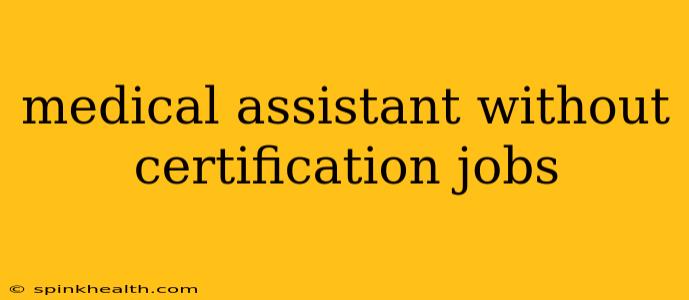Charting a Course: Finding Medical Assistant Roles Without Certification
The world of healthcare is vast and varied, and sometimes, the path to your dream job isn't always straightforward. Let's explore the possibilities for securing a medical assistant role even without the traditional certification. This isn't about circumventing essential skills, but rather understanding the different avenues available to enter this rewarding field. Think of it as a journey, not a sprint.
My name's Sarah, and I've spent years working in healthcare recruitment. I've seen firsthand how individuals with a passion for patient care, even without formal certification, find fulfilling roles. Let's delve into the options.
Can I Get a Medical Assistant Job Without Certification?
The short answer is: yes, but it's likely to be more challenging and may limit your options. Many employers prefer certified medical assistants (CMAs) or registered medical assistants (RMAs) due to the standardized training and competency these certifications signify. However, opportunities do exist, particularly in smaller clinics or practices that might prioritize other qualities.
What Kind of Medical Assistant Jobs Can I Get Without Certification?
Without certification, you'll likely find entry-level positions that focus on administrative tasks or basic clinical support. These might include:
- Receptionist/Medical Office Assistant: This role heavily emphasizes patient scheduling, insurance verification, answering phones, managing patient records (often using electronic health record systems), and handling billing. These skills often overlap significantly with the administrative duties of a CMA.
- Clinical Assistant (Limited Scope): Some clinics may hire individuals for roles that involve less complex clinical tasks, such as assisting with vital signs, room preparation, or stocking supplies. This position would require extensive on-the-job training and supervision.
- Medical Scribe: This rapidly growing field involves documenting patient encounters, essentially acting as a real-time note-taker for physicians. While not directly a medical assistant role, it provides excellent exposure to medical terminology, clinical procedures, and healthcare settings. It can be a valuable stepping stone toward a full CMA role.
How Can I Increase My Chances of Getting a Medical Assistant Job Without Certification?
While certification is beneficial, you can significantly improve your chances by focusing on these areas:
- Highlight transferable skills: Emphasize relevant experiences, even if outside of healthcare. Customer service, administrative skills, organizational abilities, and experience with data entry are all valuable assets.
- Demonstrate commitment to learning: Show employers you're dedicated to pursuing a CMA certification in the future or taking relevant continuing education courses to fill skill gaps.
- Network strategically: Connect with healthcare professionals, attend industry events, and use online platforms like LinkedIn to build your professional network. Networking can lead to unexpected opportunities.
- Volunteer or shadow: Gain hands-on experience by volunteering in a healthcare setting or shadowing a medical assistant. This practical experience is highly valued by employers.
What are the career advancement opportunities for a Medical Assistant without certification?
Even without initial certification, you can pave your way to career growth. Success in an entry-level role demonstrates your commitment and competence, making you a stronger candidate for advancement or retraining into a certified position down the line. The experience you gain will make the certification process much smoother and easier to navigate.
Is it worth getting Medical Assistant certification?
Absolutely! While it's possible to enter the field without certification, acquiring a CMA or RMA certification significantly broadens your career prospects, increases earning potential, and enhances your credibility as a competent healthcare professional. It's an investment in your future.
In conclusion, the path to becoming a medical assistant can be flexible. While certification is highly advantageous, a combination of relevant skills, experience, and a proactive approach can open doors to fulfilling roles even without formal qualifications. Remember, dedication and a passion for patient care are invaluable assets in this field. Your journey, while perhaps a little less conventional, can still lead you to a rewarding career.

